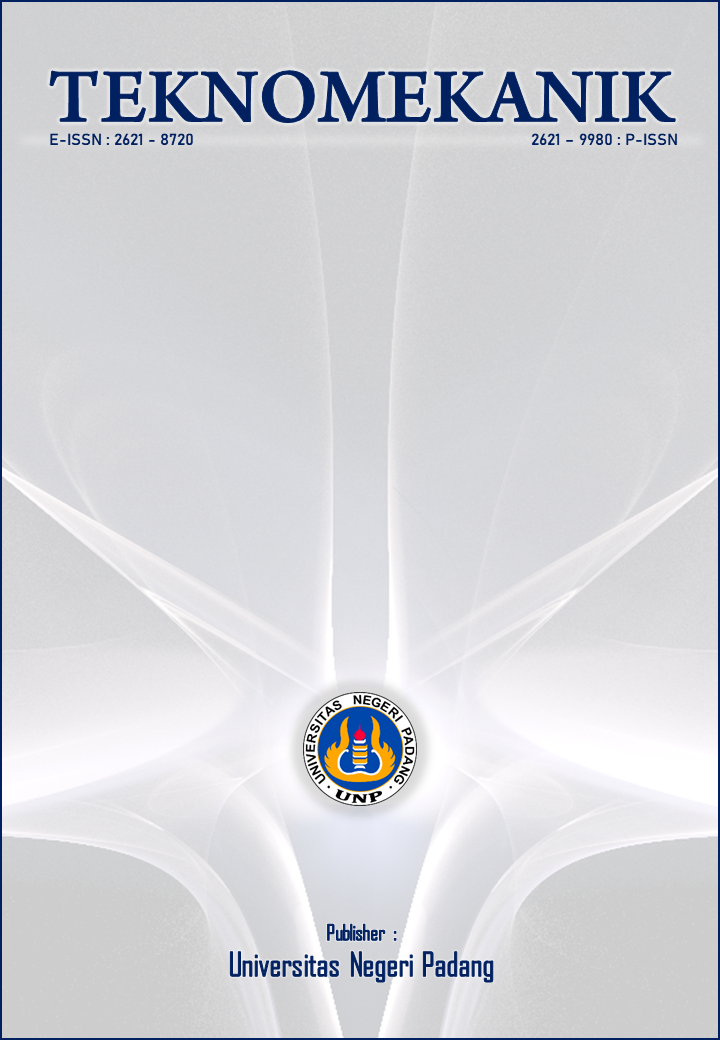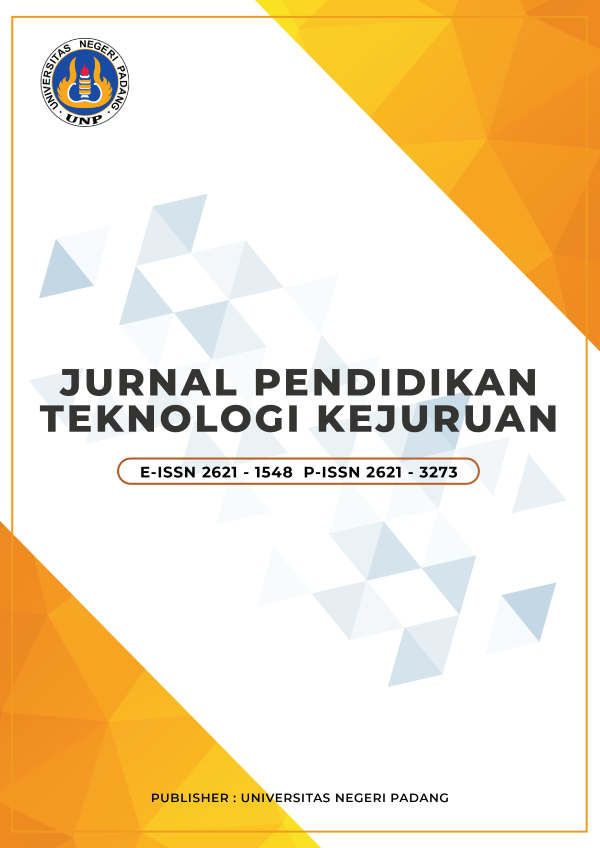Implementation of Project-Based Learning Model in Lathe Machining Technique Subjects to Improve Student Learning Outcomes
DOI:
https://doi.org/10.24036/meej.v1i2.21Keywords:
Learning Model, Project Based Learning, Learning Outcomes, Lathe MachineAbstract
Education is the most critical point in the perfection of learning, one of which is the learning model given to students. Learning outcomes are an aspect of achievement in a student's success in the classroom. Especially in student test scores conducted at the end of the semester exam shows the ability of students who have not obtained the minimum completeness value limit (KKM), so it can assume the acquisition of the results of the learning value of Lathe Machining class XI TP A at SMK Dhuafa Padang is still not as desired. This research was conducted through classroom action research. The research subject is the XI grade machining engineering students with 20 students. The research was conducted in May-June 2023 and had two cycles. This research instrument uses multiple choice test questions for the cognitive level and project observation sheets at the psychomotor level. The results of the observation of cycle one and cycle 2 prove the increase in student learning outcomes with an increase between cycles. The implementation of the first cycle obtained a score of 66.67 which increased to 78.13 in the second cycle. The percentage of classical Completeness in cycle 1 obtained a value of 60%, and there was an increase in cycle 2 to 85%. The research success indicator set is 75 with 75% classical completeness. Therefore, there is a conclusion that applying project-based learning in Lathe Machining Engineering subjects can develop motivation and improve student learning outcomes.
Downloads
References
Akimov, N., Kurmanov, N., Uskelenova, A., & Aidargaliyeva, N. (2023). Components of education 4.0 in open innovation competence frameworks: Systematic review. Journal of Open Innovation: Technology, Market, and Complexity, 9(2), 100037. https://doi.org/10.1016/j.joitmc.2023.100037
Alam, A. (2022). Employing Adaptive Learning and Intelligent Tutoring Robots for Virtual Classrooms and Smart Campuses: Reforming Education in the Age of Artificial Intelligence. Lecture Notes in Electrical Engineering, 914, 395–406. https://doi.org/10.1007/978-981-19-2980-9_32/COVER
Azorín, C. (2020). Beyond COVID-19 supernova. Is another education coming? Journal of Professional Capital and Community, 5(3–4), 381–390. https://doi.org/10.1108/JPCC-05-2020-0019/FULL/XML
Bhaduri, S., Biddy, Q., Elliott, C. H., Jacobs, J., Rummel, M., Ristvey, J., Sumner, T., & Recker, M. (2022). Co-designing a rural research practice partnership to design and support STEM pathways for rural youth. Theory & Practice in Rural Education, 12(2), 45–70. https://doi.org/10.3776/tpre.2022.v12n2p45-70
Chuang, S. (2021). The Applications of Constructivist Learning Theory and Social Learning Theory on Adult Continuous Development. Performance Improvement, 60(3), 6–14. https://doi.org/10.1002/pfi.21963
Daskan, A., & Yildiz, Y. (2020). Blended Learning: A Potential Approach to Promote Learning Outcomes. International Journal of Social Sciences & Educational Studies, 7(4), 103–108. https://doi.org/10.23918/ijsses.v7i4p103
De La Torre, E. M., Perez-Encinas, A., & Gomez-Mediavilla, G. (2022). Fostering Sustainability through Mobility Knowledge, Skills, and Attitudes. Sustainability (Switzerland), 14(3), 1–14. https://doi.org/10.3390/su14031349
Ekpenyong, J. A., Owan, V. J., Ogar, J. O., Undie, J. A., Ekpenyong, J. A., Owan, V. J., Ogar, J. O., & Undie, J. A. (2022). Hierarchical linear modelling of educational outcomes in secondary schools: What matters-teachers’ or administrators’ input? Cogent Education, 9(1), 1–25. https://doi.org/10.1080/2331186X.2022.2133491
Farooq, R., Zhang, Z., Talwar, S., & Dhir, A. (2022). Do green human resource management and self-efficacy facilitate green creativity? A study of luxury hotels and resorts. Journal of Sustainable Tourism, 30(4), 824–845. https://doi.org/10.1080/09669582.2021.1891239
Geng, S., & Law, K. M. Y. (2019). Investigating self-directed learning and technology readiness in blending learning environment. International Journal of Educational Technology in Higher Education, 16(17), 1–22. https://doi.org/10.1186/s41239-019-0147-0
Hanif, M. (2020). The development and effectiveness of motion graphic animation videos to improve primary school students’ sciences learning outcomes. International Journal of Instruction, 13(4), 247–266. https://doi.org/10.29333/iji.2020.13416a
Hernández, M., Antonio, D. M., Guevara, V., Carlos, J., Martínez, T., Hernández, D., Ruben, A., & Menendez, M. (2019). Active learning in engineering education. A review of fundamentals , best practices and experiences. International Journal on Interactive Design and Manufacturing, 909–922. https://doi.org/10.1007/s12008-019-00557-8
Meyer, M. W., & Norman, D. (2020). Changing Design Education for the 21st Century. She Ji: The Journal of Design, Economics, and Innovation, 6(1), 13–49. https://doi.org/10.1016/j.sheji.2019.12.002
Oliveira, G., Grenha Teixeira, J., Torres, A., & Morais, C. (2021). An exploratory study on the emergency remote education experience of higher education students and teachers during the COVID-19 pandemic. British Journal of Educational Technology, 52(4), 1357–1376. https://doi.org/10.1111/bjet.13112
Qadir, J., & Al-fuqaha, A. (2020). A Student Primer on How to Thrive in Engineering Education during and beyond COVID-19. Education Sciences, 10(9), 1–22. https://doi.org/10.3390/educsci10090236
Ratajczak, M. Z., & Ratajczak, J. (2020). Extracellular microvesicles/exosomes: discovery, disbelief, acceptance, and the future? Leukemia, 3126–3135. https://doi.org/10.1038/s41375-020-01041-z
Syahril, Purwantono, Wulansari, R. E., Nabawi, R. A., Safitri, D., & Kiong, T. T. (2022). The Effectiveness of Project-Based Learning On 4Cs Skills of Vocational Students in Higher Education. Journal of Technical Education and Training, 14(3), 29–37. https://doi.org/10.30880/jtet.2022.14.03.003
Syahril, S., Nabawi, R. A., & Safitri, D. (2021). Students’ Perceptions of the Project Based on the Potential of their Region: A Project-based Learning Implementation. Journal of Technology and Science Education, 11(2), 295–314. https://doi.org/10.3926/JOTSE.1153
Syauqi, K., Munadi, S., & Triyono, M. B. (2020). Students’ perceptions toward vocational education on online learning during the COVID-19 pandemic. International Journal of Evaluation and Research in Education, 9(4), 881–886. https://doi.org/10.11591/ijere.v9i4.20766
Yasmin, M., Naseem, F., & Masso, I. C. (2019). Studies in Educational Evaluation Teacher-directed learning to self-directed learning transition barriers in Pakistan. Studies in Educational Evaluation, 61(1), 34–40. https://doi.org/10.1016/j.stueduc.2019.02.003
Downloads
Published
How to Cite
Issue
Section
License
Copyright (c) 2023 Pres Megari, Mulianti Mulianti, Yufrizal A

This work is licensed under a Creative Commons Attribution-ShareAlike 4.0 International License.
Most read articles by the same author(s)
- Yang Yung Irawan, Yufrizal A, Purwantono Purwantono, Randi Purnama Putra, The Contribution of Workshop Management to Students' Learning Outcomes in Vocational High School , Mechanical Engineering Education Journal: Vol. 1 No. 1 (2023): Regular Issue
- Angger Prayogi, Febri Prasetya, Yufrizal A, Bulkia Rahim, Increased interest and learning outcomes of vocational high school students through the use of CNC lathe simulators , Mechanical Engineering Education Journal: Vol. 1 No. 1 (2023): Regular Issue
- Hanafi Akbar, Mulianti Mulianti, Irzal Irzal, Adri Junil, Relationship between the completeness of occupational safety facilities and the rate of workplace accidents , Mechanical Engineering Education Journal: Vol. 1 No. 2 (2023): Regular Issue
- Qhairunnisa Qhairunnisa, Ambiyar Ambiyar, Nelvi Erizon, Mulianti Mulianti, Development of problem-based learning module on fundamentals of mechanical engineeri , Mechanical Engineering Education Journal: Vol. 1 No. 4 (2023): Regular Issue
Similar Articles
- Jefri Aditia, Jasman Jasman, Irzal Irzal, Zainal Abadi, Relationship between the Implementation of Occupational Health and Safety and Practical Turning Learning Outcomes of Vocational High School Students , Mechanical Engineering Education Journal: Vol. 1 No. 2 (2023): Regular Issue
You may also start an advanced similarity search for this article.




